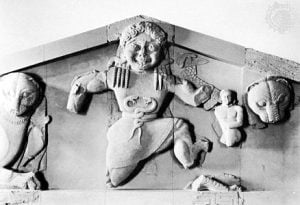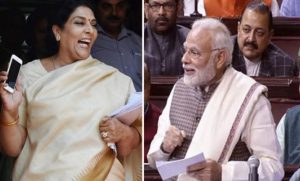There has always been a universally approved conspiracy to either reprimand or mock women for being their natural selves. And those who don’t fall prey to such conspiracies are typecast as vamps, socially destructive elements, immoral beings and almost ostracized. One attribute that connects all these ‘dangerous women’ is their unapologetic, full-throated laughter. From Shurpanakha to Kamolika, all these women have had tainted episodes of laughing hysterically sending shivers across universe. Women’s laughter has always been something that our society condemns.
The Indian pop culture ‘intelligentsia’ has successfully turned this blatant emotional expression into a comical trope which gets used in almost every so-called spooky Indian show. One always finds female spirits laughing to their heart’s content. But why does a saree-clad ghost have to laugh out loud in the highest possible decibel at the end of every sentence? Why is she laughing all the time? Perhaps to let out all the repressed emotions which remained hidden while she was alive. Or maybe she just wants to laugh at the ridiculous conspiracy which is intolerant to a happy woman. The lecherous phrase “hasee toh phasee” (If she smiles, she is ensnared) doesn’t match with these extraterrestrial beings because a loud laugh is probably her expression of power and not an invitation.
Feeble Filmy Heroines
Bollywood has had chuckling heroines or giggling female friends. Rarely have we seen a mainstream heroine laughing fearlessly in public without covering her mouth. She always laughs with her friends or behind the closed doors of her room. There are various scenes where we see female friends lurking around the prospective groom and giggling in low-decibel tones. These female friends are often called loud, immoral and too ‘unsanskari’.

Image Source: Glamrs
While spooky television shows have turned women into saree-clad ghosts who laugh out loud, Hindi cinema has typecast such women as comically idiotic and as someone who always cracks jokes. Anjali from Kabhi Khushi Kabhi Gham is one such character. She laughs in her own style but always gets scolded for doing so. A laughing woman need not be a comical trope but Bollywood has made us believe it.
‘Dangerous’ Mythic Women
Indian mythology is no different. We all know of Draupadi’s laughter which brings a sinister turn in the Mahabharata, resulting in the deadly battle. Draupadi laughs when she sees Duryodhana slip and fall into a water pool. She exclaims, “Andhe ka Putra Andha” (The blind son of a blind king). Duryodhana feels humiliated and vows to humiliate her in public – a vow he fulfils.
The issue is not just about laughter in these cases, but is that of a woman laughing at a man.
Similarly the oral traditions of the Nath-Sampradaya have a story of a princess called Mainakini of Sinhala-Dvipa (present day Sri Lanka) who looks up at the sky and sees a celestial being on a flying chariot. Accidentally, she catches a glimpse of his genitals and bursts out into full-throated laughter. The deity curses her, saying that she would have to spend the rest of her life on the land of women where she would have no access to men. In both these stories, a woman is cursed for laughing. The issue is not just about laughter in these cases, but is that of a woman laughing at a man.
Also read: The Business Of Humour Is A ‘Man’s Job’ – But They Aren’t Even Funny?
Greek mythology also has a similar story where a laughing woman is punished and ridiculed for doing so. Helen laughs at the ill-mannered behaviour of Menelaus whom she was wedded to. She elopes with Paris, and Homer makes her the peg on which to hand the male imperial. In The Laughter of Medusa, Helene Cixous talks about how the laughing woman is always the outlier – the biggest challenge to patriarchal tropes – and therefore she must be turned into a demon. Laughing woman’s agency makes the gods shiver, so they take to collective punishment.

Greek Goddess Medusa. Image Source- Pro Profs
As explained by Devdutt Patnaik, “Laughter strips the object of power and gives power to the one who laughs. When stand-up comics make fun of someone or something, their jokes are, in effect, criticism and mockery, highlighting a social issue or a family reality.” The fact that women aren’t supposed to be funny is again a reflection of usurping women’s power. A man can tolerate anything but not a woman laughing at men in public. The political patriarchs are as intolerant as men in general and have been repeatedly stressing upon the rights and wrongs of a woman’s behaviour in public.
Politically Immoral
Back in 2014, Turkish Deputy Prime Minister Bulent Arinc preached his distorted version of ‘good behavior’ to Turkish women by telling them not to laugh in public. He said “A woman will know what is haram (forbidden) and not haram. She will not laugh out loud in public. She will not be inviting in her attitudes and will protect her chasteness.” He further added, “Where are our girls who slightly blush, lower their heads and turn their eyes away when we look at their faces, becoming the symbol of chastity?” Although set in the context of Turkey, the statements made do not seem too unfamiliar. In India too, we have heard men ridiculing women just for being the way they are.
the laughing woman is always the outlier, the biggest challenge to patriarchal tropes and therefore she must be turned into a demon.
Cut to 2018, the congress MP Renuka Choudhary was mocked by our honourable Prime Minister Narendra Modi when she laughed at him in the parliament. She laughed because of his factually incorrect statements but she was made fun of by the PM himself, who compared her to Ramayana’s Shurpanakha. She was reprimanded by the house for flouting moral conduct by laughing at the PM – but nobody dared to speak against the PM for making false claims in the Parliament. His outright insult to MP Choudhary was also not condemned by the head of the house in any way. Moreover, M. Venkaiah Naidu (Vice President of India) took it further by asking her to reduce weight as part of his moral policing exercise.

Image Source: India TV
While political patriarchs take a lot of time to understand what moral conduct stands for, creative artists make use of their liberties to debunk these misconceptions. There can be heroines who laugh at their own will. Recently, one film where we see a mainstream actress laughing that way was Tumhari Sulu. The lead actress Sulochana (also called Sulu) laughs out loud whenever she feels like it. She never shies away from bursting into intermittent guffaws in her house and her work station. There is a scene in the film where a man tells her how to laugh with grace and softness to which she retorts adorably with a peal of loud laughter, compelling the audience to laugh along.
https://www.youtube.com/watch?v=3WF2WLquiwo
We need more such mainstream heroines who laugh in whatever way they want without being ridiculed, mocked, or cursed for doing so. One cannot really claim that this representation would stir positive conversations in the society, but this will indeed compel a significant faction to ‘re-look’ at themselves. Women have suppressed their emotions for ages and it is time that they unapologetically have the last laugh.
Also read: India’s Female Comedians Are A Badass And Much-Needed Counter To Sexist Humour
Featured Image Source: The Darkroom
About the author(s)
Tanya is a post-graduate in Media Studies from Centre for Culture, Media and Governance at Jamia Milia Islamia. She is passionate about music, cinema and lots of street food.




